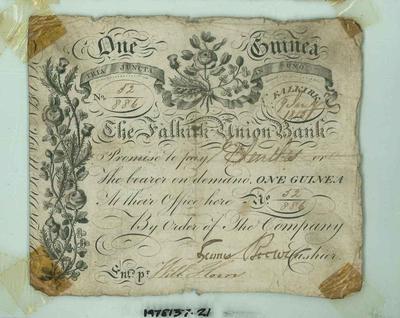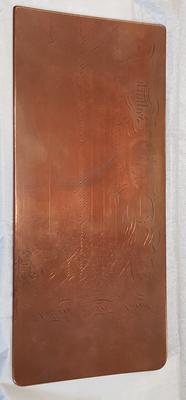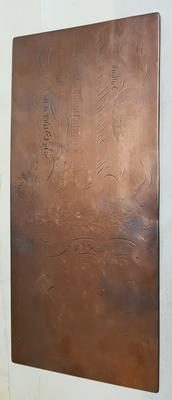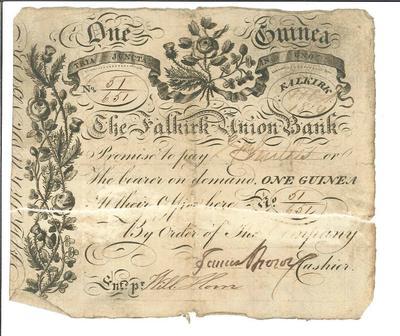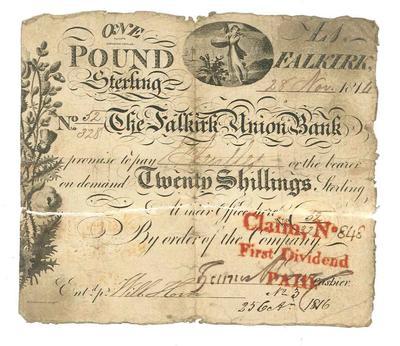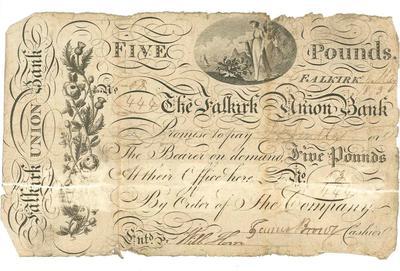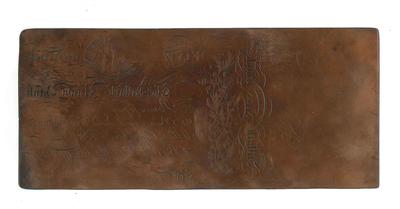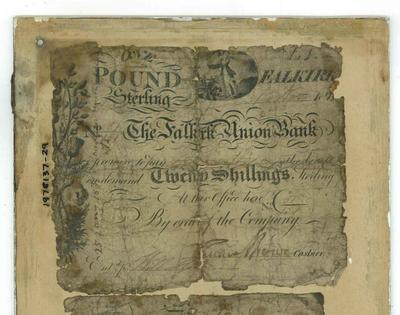Falkirk Union Bank
Biography
After the financial success of the Falkirk Banking Company, a number of gentlemen of means in Falkirk and district ventured to establish a similar concern in opposition, to be known as The Falkirk Union Bank. It began on 5th July, 1803. The partners were originally fourteen in number, to which six were afterwards added: Alexander Glen of Falkirk, Thomas Mair of Pottishaw, William Coubrough of Elrig, Robert Gillespie of Plean Mill, James Brown of Broomage, William Glen and Son, Mains, James Aitken, Writer, Falkirk, Archibald Hardie, merchant, Bo'ness, Dr John Corbet of Mount Vaccine, Andrew Bell, John Crawford, Peter Muirhead, John Young, Merchants in Falkirk. They appointed James Brown to be their cashier, whose signature for behalf of the Company was to be binding on them; and they appointed Messrs Donald Smith and Co. to be their agents at Edinburgh.
The building in which the Falkirk Union Bank commenced and finished business stood at the north-east corner of Bank Street, the ground floor later being used as the business premises of Mr William Stevenson, solicitor. It was constructed as a "Banking Office" by James Brown, one of the partners of the bank, also cashier - formerly of Broomage, Larbert - in room of some older buildings. Some in Falkirk doubted the wisdom of the venture from the beginning, especially as the Falkirk Banking Company had the entire confidence of local merchants and others with whom they had dealings. Many of the partners of the newly-formed Union Bank were small lairds and farmers with no great business ability, and the cashier had only been a clerk in a country writer's office.
One of the founders of the Union Bank was Mr Thomas Mair of Pottishaw, a Bathgate merchant and younger brother of Patrick Mair, printer in Falkirk. Thomas Mair was at one time agent in Bathgate for the Falkirk Banking Company, but severed his connection with the concern. On the founding of the Falkirk Union Bank he acted as agent in Bathgate. He died in 1808.
The original capital of the bank was £12,000, and the guinea notes were poorly engraven, bearing at the top and down the left margin representations of the Rose, Thistle, and Shamrock intertwined with the motto, "Tria juncta in uno," on a wavy scroll across the top. In 1812 these notes were payable to William Gentles and signed by James Brown, cashier, and countersigned by William Horn. On the one and five pound notes the motto, as on the guinea notes, was not given, but they contained the draped figure of a female with a rod in her left hand on which she leans, the right hand being outstretched towards a picture of the ocean with ships in the distance.
The business was chiefly with cattle dealers and farmers, but the bank was never a success, and closed its doors on 18th October, 1816, its liabilities, including the notes in circulation, amounting to about £60,000. The partners at the sequestration were Messrs James Brown of Broomage - the cashier of the bank - William Coubrough of Elrigg, James Aitken, writer in Falkirk, Robert Gillespie, residing in Falkirk, William Glen of Mains, Linlithgow and his son, John Glen, Linlithgow. The trustee appointed in the sequestration for the creditors was James Russel, writer, Falkirk.
"Malachi Malagrowther," which was the signature of Sir Walter Scott to a series of letters in 1822 contributed to the "Edinburgh Review " upon the lowest limitation of paper money to £5, cites the Falkirk Union Bank as one of the few instances of bank failures in Scotland, and states that it "paid up its engagements without much loss to its creditors." The following is the exact amount paid to creditors of the Falkirk Union Bank after its failure:- 1st dividend, three shillings: 2nd dividend, three shillings; 3rd dividend, two shillings; 4th dividend, one shilling; 5th dividend, sixpence halfpenny - total, 9s 6½d.
The "final dividend" was ordered to be paid at a meeting held on 16th July 1832. In the closing months of that year the trustee, Mr James Russel, announced his intention of applying to the Court of Session for a discharge. Twenty-two years later (1851) a substantial number of the creditors had not claimed their dividends, and the trustee intimated that he intended uplifting the money lying in the Commercial Bank and lodging it in the Court along with his application for discharge as trustee.
In 1820 "The Commercial Banking Company of Scotland," secured the premises of the defunct Union Bank, and opened them for business on 19th June of that year. In the following year they purchased the building.
The building in which the Falkirk Union Bank commenced and finished business stood at the north-east corner of Bank Street, the ground floor later being used as the business premises of Mr William Stevenson, solicitor. It was constructed as a "Banking Office" by James Brown, one of the partners of the bank, also cashier - formerly of Broomage, Larbert - in room of some older buildings. Some in Falkirk doubted the wisdom of the venture from the beginning, especially as the Falkirk Banking Company had the entire confidence of local merchants and others with whom they had dealings. Many of the partners of the newly-formed Union Bank were small lairds and farmers with no great business ability, and the cashier had only been a clerk in a country writer's office.
One of the founders of the Union Bank was Mr Thomas Mair of Pottishaw, a Bathgate merchant and younger brother of Patrick Mair, printer in Falkirk. Thomas Mair was at one time agent in Bathgate for the Falkirk Banking Company, but severed his connection with the concern. On the founding of the Falkirk Union Bank he acted as agent in Bathgate. He died in 1808.
The original capital of the bank was £12,000, and the guinea notes were poorly engraven, bearing at the top and down the left margin representations of the Rose, Thistle, and Shamrock intertwined with the motto, "Tria juncta in uno," on a wavy scroll across the top. In 1812 these notes were payable to William Gentles and signed by James Brown, cashier, and countersigned by William Horn. On the one and five pound notes the motto, as on the guinea notes, was not given, but they contained the draped figure of a female with a rod in her left hand on which she leans, the right hand being outstretched towards a picture of the ocean with ships in the distance.
The business was chiefly with cattle dealers and farmers, but the bank was never a success, and closed its doors on 18th October, 1816, its liabilities, including the notes in circulation, amounting to about £60,000. The partners at the sequestration were Messrs James Brown of Broomage - the cashier of the bank - William Coubrough of Elrigg, James Aitken, writer in Falkirk, Robert Gillespie, residing in Falkirk, William Glen of Mains, Linlithgow and his son, John Glen, Linlithgow. The trustee appointed in the sequestration for the creditors was James Russel, writer, Falkirk.
"Malachi Malagrowther," which was the signature of Sir Walter Scott to a series of letters in 1822 contributed to the "Edinburgh Review " upon the lowest limitation of paper money to £5, cites the Falkirk Union Bank as one of the few instances of bank failures in Scotland, and states that it "paid up its engagements without much loss to its creditors." The following is the exact amount paid to creditors of the Falkirk Union Bank after its failure:- 1st dividend, three shillings: 2nd dividend, three shillings; 3rd dividend, two shillings; 4th dividend, one shilling; 5th dividend, sixpence halfpenny - total, 9s 6½d.
The "final dividend" was ordered to be paid at a meeting held on 16th July 1832. In the closing months of that year the trustee, Mr James Russel, announced his intention of applying to the Court of Session for a discharge. Twenty-two years later (1851) a substantial number of the creditors had not claimed their dividends, and the trustee intimated that he intended uplifting the money lying in the Commercial Bank and lodging it in the Court along with his application for discharge as trustee.
In 1820 "The Commercial Banking Company of Scotland," secured the premises of the defunct Union Bank, and opened them for business on 19th June of that year. In the following year they purchased the building.

